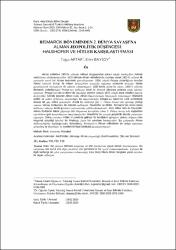| dc.contributor.author | Artar, Tuğçe | |
| dc.contributor.author | Baysoy, Emre | |
| dc.date.accessioned | 2022-05-11T14:10:27Z | |
| dc.date.available | 2022-05-11T14:10:27Z | |
| dc.date.issued | 2020 | |
| dc.identifier.issn | 1302-2741 | |
| dc.identifier.issn | 2148-4945 | |
| dc.identifier.uri | https://app.trdizin.gov.tr/makale/TkRFeU5ESXdNQT09 | |
| dc.identifier.uri | https://hdl.handle.net/20.500.11776/5405 | |
| dc.description.abstract | Alman milletleri 1800'lü yıllarda milliyet duygusundan yoksun küçük devletçikler hâlinde varlıklarını sürdürmekteydiler. Millî bilincin Alman milletlerinde oluşması ancak 1800’lü yılların ilk yarısında sınırlı bir Alman kesiminde gerçekleşmiştir. 1834 yılında Prusya önderliğinde kurulan Alman Gümrük Birliği ile Alman devletçikleri arasında sağlanan ekonomik birleşme ileride gerçekleşecek birleşmenin ilk adımını oluşturmuştur. 1830’larda atılan bu adımı, 1860’lı yıllarda Bismarck önderliğindeki Prusya’nın milliyetçi ideal ile Birleşik Almanya yolunda attığı adımlar izlemiştir. Prusya’nın kan ve demir ile kazandığı zaferler sonucu 1872 yılında daha önceleri dağınık devletçikler hâlinde bulunan Alman halkı, Alman İmparatorluğu bünyesinde toplanmıştır. Bismarck politik ve askerî dehasıyla oluşturduğu bu imparatorluğu Avrupa’nın kaderine şekil verebilecek devasa bir güç hâline getirmiştir. Ancak bu milliyetçi güç 1. Dünya Savaşı’nda uğradığı yenilgi sonrası Versay Antlaşması ile ortadan kalkmıştır. Haushofer ve Hitler, Bismarck’tan miras kalan milliyetçi anlayışı kendi görüşleri çerçevesinde şekillendirmişlerdir. Hem Hitler hem de Haushofer Alman devletinin tekrar güçlenip eski ihtişamına kavuşması adına 1. Dünya Savaşı’nda kaybedilen toprakların geri kazanılmasını amaçlamışlardır. Haushofer bu amaçla jeopolitik alanda çalışmalar yapmıştır. Daha sonraları Hitler’in yönetime gelmesi ile kendisinin görüşleri sonucu doğmuş olan nasyonal sosyalist İdeoloji ile Almanya, faşist bir yönetime bürünecektir. Bu çalışmada Alman milliyetçiliğinin başlangıcından bahsedimiş, Bismarck’ın Alman milletlerini bir araya toplaması anlatılmış ve Haushofer’ın teorileri ile Nazi ideolojisi karşılaştırılmıştır. | en_US |
| dc.description.abstract | German people existed without the spirit of nationality as small states in the 1800’s. It was only in the first half of the 1800’s that national consciousness started to emerge within a limited number of German states. The German states’ economic unification was ensured in 1834 with the establishment of German Customs Union by Prussian leadership. This economic unification was the first step for the political unification that would happen in the future. In 1860s this economic unification was followed with new steps by Prussian national ideals to unify Germans under the leadership of Bismarck as a result of Prussian victories won with “blood and iron”, and German people unified under the German Empire. Bismarck who created the Empire with his political and military brilliance also made the Empire one of the great powers that would shape the destiny of Europe. But after the defeat in World War 1, the empire was disbanded with the Versailles Treaty. Haushofer and Hitler shaped the German nationalism in their own way. Both Haushofer and Hitler’s purpose was to create a powerful Germany once again by reconquering the territories they lost after World War 1. Haushofer, in order to achieve these aims, developed German geopolitical vision in the name of Lebensraum. After Hitler’s taking over the power, with his national socialist ideology, Germany was led into fascism. In this article, the emergence of German nationalism and Bismarck’s unification of German nations were examined and Haushofer and Hitler’s nationalist ideas were compared. | en_US |
| dc.language.iso | tur | en_US |
| dc.rights | info:eu-repo/semantics/openAccess | en_US |
| dc.title | Bismarck Döneminden 2. Dünya Savaşı'na Alman Jeopolitik Düşüncesi: Haushofer ve Hitler Karşılaştırması | en_US |
| dc.title.alternative | German Geopolitics from Bismarck's Era to World War 2: Comparison of Haushofer and Hitler | en_US |
| dc.type | article | en_US |
| dc.relation.ispartof | Kara Harp Okulu Bilim Dergisi | en_US |
| dc.department | Fakülteler, İktisadi ve İdari Bilimler Fakültesi, Uluslararası İlişkiler Bölümü | en_US |
| dc.department | Enstitüler, Sosyal Bilimler Enstitüsü, Küreselleşme ve Uluslararası İlişkiler Ana Bilim Dalı | en_US |
| dc.identifier.volume | 30 | en_US |
| dc.identifier.issue | 1 | en_US |
| dc.identifier.startpage | 1 | en_US |
| dc.identifier.endpage | 24 | en_US |
| dc.institutionauthor | Artar, Tuğçe | |
| dc.institutionauthor | Baysoy, Emre | |
| dc.identifier.trdizinid | TkRFeU5ESXdNQT09 | en_US |



















